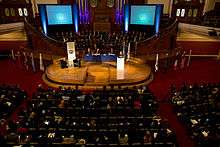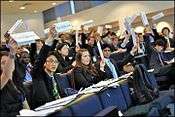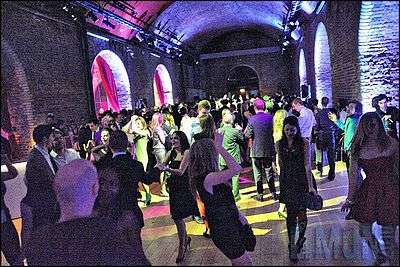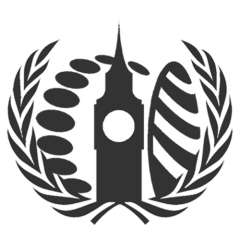London International Model United Nations
|
Emblem of the Conference | |
| Abbreviation | LIMUN |
|---|---|
| Formation | 2000 |
| Type | 3 day Conference, February |
| Legal status | Charity (England and Wales, 1096197) |
| Purpose | Recreative and Educational |
| Location |
|
Secretary-General | Afolabi Adekaiyaoja |
Main organ | Secretariat, Board of Trustees |
| Website | www.limun.org.uk |
The London International Model United Nations (LIMUN) is an annual three-day Model United Nations conference in London, United Kingdom. Taking place every February since 2000, LIMUN has established itself as Europe’s largest such conference at university-level,[1] bringing together over 1500 students – with some high school students and recent graduates – to deliberate on issues of global concern. It is organised by students from the various colleges of the University of London and other London-based universities. LIMUN 2016 took place from 26–28 February 2016.
History
Inception and growth
LIMUN was known as London Model United Nations (LoMUN) until 2002.[2] It held its first conference in 2000, and was conceived by a group of University of London (UoL) students who had attended a Model UN conference in 1999 in Cambridge, Massachusetts (Harvard World Model United Nations 1999).[3] The aim was to organise an annual Model UN event in London, in conjunction with the other University of London colleges. The first conference in 2000 involved about 200 delegates over 5 committees. In 2007, this figure grew to about 500, and later to 700 over 12 committees in 2008.
In 2009, LIMUN held its first milestone conference at King's College London, celebrating its 10th anniversary with 800 delegates spread over 12 committees. New committees were also introduced, expanding to about 16 in 2011. 2012 marked a peak, as about 1,200 delegates were spread over 20 committees at Imperial College;[4] and, finally in 2013, LIMUN reached its current status as it attracted approximately 1500 delegates in 25 committees.[5] In June 2014 LIMUN also organised an MUN session in collaboration with the Foreign and Commonwealth Office as part of the Global Summit to End Sexual Violence in Conflict, which was chaired by Foreign Secretary William Hague and Angelina Jolie, Special Envoy for the UN High Commissioner for Refugees.[6]
Past conference venues
Since 2011, LIMUN taken place at Imperial College London. LIMUN has its opening ceremony and registration elsewhere, which since its 2013 edition has been at Central Hall Westminster,[4] where the first-ever session of the United Nations General Assembly was held in 1946.[7] In previous years, registration and the opening ceremony most often took place at the Institute of Education, and committee-sessions at King's College London (Waterloo Campus),[8][9][10][11] but University College London,[3] the London School of Economics,[2] Imperial, Central Hall and Canada House have been used occasionally before as well.[12]
Past speakers

In 2015:[13]
- Lord Mark Malloch-Brown, former UN Deputy Secretary-General;
- Mrs. Natalie Samarasinghe, Executive Director of the United Nations Association - UK.
In 2014:[14]
- Sir Stephen Irwin QC, High Court Judge;
- Mr. Koji Sekimizu, Secretary-General of the International Maritime Organization.
In 2013:[15]
- John Ericson, Chief of the Outreach Unit of the Office of Human Resources Management of the United Nations Secretariat;
- Anne-Marie Leroy, Senior Vice-President and General Counsel of the World Bank Group;
- Edward Mortimer, Chief Speech Writer and Director of Communications to former Secretary-General Kofi Annan;
- Federico Alberto Cuello Camilo, Ambassador of the Dominican Republic to the United Kingdom and former Permanent Representative of the Dominican Republic to the United Nations.

In 2012:
- Sir Jeremy Greenstock, Chairman of the United Nations Association of the United Kingdom and former Permanent Representative of the United Kingdom to the United Nations;
In 2011:
- Jung Chang, best-selling author of Wild Swans: Three Daughters of China and Mao: The Unknown Story.
In 2010:
- Luis Moreno Ocampo, Prosecutor of the International Criminal Court;
- David Hallam, Deputy Director of the UK Department for International Development and Head of its United Nations and Commonwealth Section.
In 2009:
- Minouche Shafik, then Permanent Secretary of the Department of International Development (since 2011 Deputy Managing Director of the International Monetary Fund);
- Nicholas Hopton, then Deputy Director of the International Organisations Department at the Foreign and Commonwealth Office (later UK Ambassador to Yemen).
In 2008:
- David Nabarro, then Senior UN System Coordinator for Avian and Human Influenza.
In 2007:
In 2006:
- Lord David Hannay, Diplomat and former Chair of the Board of the United Nations Association of the United Kingdom.[16]
Purpose
The purpose and benefits of a Model UN conference such as LIMUN can be generally classified into two strands: first, personal development (the skills gained or developed through participation, whether as delegate, chair, secretariat-member); second, the instilling of a cosmopolitan ethic in its participants.
- Delegates:
- Deepen understanding of the United Nations (System), its work, and of contemporary issues in world politics.
- Improve public speaking, rhetoric, negotiation and reasoning/analytic skills.
- Training in creativity, problem-solving and the finding of compromise.
- Chairs:
- Early training in management/public administration.
- Test of proactivity and training in problem-solving.
- Secretariat:
- Develop administrative and planning skills.
In regards to the instilling of a cosmopolitan ethic, the most essential purpose of LIMUN and MUN is to spread cosmopolitan values across new generations, to address the problems that confront humanity. Model UN has an essential message to convey: all men, women and children, regardless of where they live or where they come from, are deserving of equal concern and respect; all human beings, anywhere and everywhere, form part of one single grand community, indivisible. Nations may be of importance for one’s self-conception and identification, but are of no concern to moral deliberation – states even less so, which are considered naught but imaginary lines drawn arbitrarily. As such, each is a citizen of the world.[17]
Organisation
Trustees, secretariat and logistics staff
The London International Model United Nations annual conference is organised by the trustees, the secretariat, and the Logistics Staff.
As LIMUN is a registered charity, it must be run by a Board of Trustees which bears responsibility for the charity. These trustees are, in essence, the governors of LIMUN, who ensure that the organisation attains its goals and adheres to Charity Law.[18]
These trustees delegate the task of organising the conference to the Organising Committee, known as the Secretariat. The Secretariat is a group of students from the various colleges of the University of London and other London-based universities, who give their time freely to organise the annual Model United Nations conference. Under the leadership of the Secretary-General, who supervises the Secretariat, they deal with tasks such as: advertising the conference and coordinating applications, managing the outreach programme, selecting Directors. The next Secretary-General is elected by the Board of Trustees and the previous Secretariat soon after the previous conference, and is then left to select the rest of the new Secretariat. Positions and roles may differ from year to year.
In addition to the trustees and the Secretariat, LIMUN recruits volunteers, called the Logistics Staff, who help with a great variety of tasks to ensure the smooth running of the conference, including: preparation of the conference venue, the social programme venue, and assisting directors with the operation of the committee sessions.[19]
Committees, directors and delegates
At a MUN conference, the bulk of a participant’s time is spent during committee sessions, which is when debate takes place. Committees, at LIMUN, are classified into three levels of difficulty: beginner, intermediate and advanced. Committees differ from year to year depending on the whims of the Secretariat and the number of attending delegates; yet, certain core ones are retained, such as the General Assembly committees (namely DISEC, ECOFIN, SOCHUM and SPECPOL), the Security Council, the Human Rights Council, some Crisis Committees, and the International Court of Justice (ICJ).
Each of these committees is then headed by two or three chairpersons which together form the Dais. One serves as the director, and the others as assistant directors, whom are selected by the Under-Secretary-General for Chairs. The director is a highly experienced member of the Model UN community who have attended many conferences as delegate, but also has previous Dais experience; the assistant directors are also experienced as delegates, and have most likely served as chair before at other conferences.
These directors submit a number of potential topics of discussion to the Secretariat, who then reviews and selects two or three for debate during the conference. Once the topics are chosen, the Directors write a Study Guide/Research Report for each topic so that delegates may have an effective source from which to commence their research. Delegates are then asked to submit a Position Paper – a document that outlines the views of their state on each of the topics – to the committee Director.
In February, when the LIMUN conference takes place, directors and delegates of a specific committee convene to let debate take its course. The sizes of committees differ very much from, for instance, the 15 members of the Security Council to about 70 in DISEC, but the rules are broadly the same, except for special agencies like the ICJ. Delegates, who each represent a country, are the speakers of the committee and give course to debate: by collective vote they determine in what order of topics the agenda is set, what to discuss, when and for how long, and ultimately which proposed resolutions are to be accepted and which are not. Directors, for their part, regulate the debate by choosing which speakers to entertain and at times suggesting potential courses of action. They also review Working Papers (delegates’ very rough drafts of resolutions to be presented to the committee), Draft Resolutions (proposed resolutions) and Amendments (suggested modifications to draft resolutions) upon their submission. Below follows a general outline of a committee-sessions’ flow of debate:

- Setting the agenda;
- Entertaining delegates on the General Speaker’s List;
- Holding moderated and unmoderated caucuses on:
- General ideas,
- Working papers,
- Draft resolutions,
- Amendments on draft resolutions;
- Adopting or rejecting draft resolutions.
Press
Each year, LIMUN also has a press team that roams around the committees, observing what occurs. Their work includes the production of interviews with keynote speakers, Secretariat members, delegates and chairs, the production of videos and photographs of the conference, and written pieces on the development of events both in committee sessions and the conference as a whole.[20]
Outreach
LIMUN is committed to extending knowledge of international affairs, and other benefits of practising Model United Nations, to all young people; hence the Charity includes an outreach programme, working with inner-London youth groups to extend access to those whom would not otherwise have the opportunity of experiencing MUN.[21] LIMUN works with several secondary school MUN programmes, assisting with workshops, conference management and development. During LIMUN's annual conference itself, LIMUN offers scholarships to secondary school students. In 2014, LIMUN offered two expenses-paid scholarships in collaboration with United Nations Association – UK, recipients of which won an essay competition laid on by LIMUN. These delegates not only represent intelligent, internationally minded youths, but also the cornerstone of a younger generation of LIMUN attendees. Their essays are published on the LIMUN website in record of their achievement and dedication to MUN.
Additionally, each year, LIMUN welcomes a number of high school students from Pestalozzi International Village, a charitable organisation based in Surrey that provides education to bright youths of less economically developed countries. In addition to providing for a group of these students each year, LIMUN sends secretariat members to the school to run various MUN training workshops in preparation for their attendance at LIMUN.
Venues
Since 2011, LIMUN’s committee sessions and closing ceremony have taken place at Imperial College London and, since its 2013 edition, registration and the opening ceremony at Central Hall Westminster. The venues for the social event are susceptible to change every year.
Central Hall Westminster, where the first session of the United Nations General Assembly was held in 1946, is a conference centre in Central London, built between 1905 and 1911 as a Methodist Church but also as "a meeting place for all people, regardless of religious persuasion… for conferences on religious, educational, scientific, philanthropic and social questions".[7] As such, the Hall has housed meetings of historical significance: there, British Suffragettes campaigned for women’s rights in 1914, General Charles de Gaulle founded the Free French Forces following the initial defeat of France, and Winston Churchill addressed the Conservative Party in 1945. There, also, during the first meeting of the UN General Assembly, the Security Council and International Court of Justice were founded, and Trygve Lie was elected the first Secretary-General. It continues serving as a centre for political conferences.[7]
Imperial College London, is a world-class university specialising in medicine, engineering, business and the natural sciences; it used to be a college of the University of London and is located in the South Kensington area of London.
Funding
The overwhelming majority of LIMUN’s funds for the conference stem from the revenue acquired by delegate fees, but the charity also benefits from the generous support of sponsors. Most recently, these have included: Linklaters, the French and Saudi Arabian embassies, UNA-UK, the Hult International Business School and others.[22]
Sample schedule
The majority of a delegate's time at LIMUN is spent in committee-sessions, punctuated by pre-determined breaks, social events, and other such activities. The three-day schedule at LIMUN generally follows the format below:[23]
- Friday
- Registration begins Friday morning in Central Hall Westminster, when head delegates register their delegations and are given materials for the conference.
- The opening ceremony soon follows registration (or registration continues during and after it); the secretariat welcomes partakers, and keynote speakers address the assembly.
- The first committee-session begins at Imperial College a few hours after the opening ceremony.
- The first social event later concludes the day.
- Saturday
- Most of the day is spent during committee-session except for the few pre-determined breaks (and, potentially, some short extra breaks the chairs and delegates agree to) and lunch.
- Head delegates are to meet with the secretariat after the last session of the day to provide feedback.
- The main social event is held later.
- Sunday
- Committee-sessions last for half the day, interrupted by lunch and occasional short breaks.
- The closing ceremony takes place once sessions over – during which, inter alia, awards are issued – and the Secretary-General declares the conference over.

List of Secretaries-General
Here follows a list of past Secretaries-General:[24]
| Session | Name | Nationality | School |
|---|---|---|---|
| 2000 | Michael Rogers | British | King's College |
| 2001 | Tamara Cavanna | British | University College |
| 2002 | Stephanie Stavrinides | British/Cypriot | King's College |
| 2003 | Kathryn Rogers | British | London School of Economics |
| 2004 | Irina Janakievska | Macedonian | London School of Economics |
| 2005 | Rui Ho | Chinese | London School of Economics |
| 2006 | Kirsten Gislesen | Norwegian | King's College |
| 2007 | Jehan Karim | Canadian | Imperial College |
| 2008 | Jasper Pandza | German | King's College |
| 2009 | Rishi Raithatha | British | School of Oriental and African Studies |
| 2010 | Alizeh Kohari | Pakistani | London School of Economics |
| 2011 | Isabella Torres-Maluf | Brazilian | Imperial College |
| 2012 | Anmol Arora | Indian | Imperial College |
| 2013 | Anniete Cohn-Lois | Dominican | Hult International Business School |
| 2014 | Kacper Pancewicz | Polish | Queen Mary |
| 2015 | Wilf Mountfield | British | Queen Mary |
| 2016 | Dalí ten Hove | Dutch | King's College |
| 2017 | Afolabi Adekaiyaoja | Nigerian | Queen Mary |
See also
- United Nations Association – UK
- Model United Nations
- List of Model United Nations conferences
- Category:Youth model government
- Mock Parliament
- Cosmopolitanism
- Global civics
- World Citizen
- World Federalism
References
- ↑ LIMUN's Linkedin page.
- 1 2 Microsoft OneDrive login page.
- 1 2 Lui, Rowena (17 February 2013). "Back to the Beginning…". Edited by Dobriyana Tropankeva. LIMUN 14th session, 2013.
- 1 2 "Our History". London International Model United Nations.
- ↑ LIMUN 2013. Retrieved 29 July 2013.
- ↑ "FCO Partnership Event" London International Model United Nations. Retrieved 19 May 2014.
- 1 2 3 "Background to the Building". Central Hall Westminster. Last modified 2013.
- ↑ LIMUN Secretariat. "LIMUN 2012 Annual Report". Charity Commission for England and Wales.
- ↑ "LIMUN Archive 2008"
- ↑ "LIMUN Archive 2009".
- ↑ "LIMUN Archive 2010"
- ↑ "LIMUN 2007 Delegate Handbook".
- ↑ 2015 Conference. LIMUN 16th session, 2015.
- ↑ 2014 Conference. LIMUN 15th session, 2014.
- ↑ Ghalib, Fozan. Bestdelegate. "When you start in LIMUN, you fall in love with it". London International Model United Nations 2013 LIVEBLOG.
- ↑ "Guests & Speakers".
- ↑ Dalí ten Hove. "The purposes and benefits of Model United Nations and LIMUN".
- ↑ "Meet the Trustees".
- ↑ "Volunteering Opportunities".
- ↑ LIMUN Press 2012.
- ↑ "Outreach".
- ↑ "Support". LIMUN 2013.
- ↑ LIMUN 2011 Secretariat. "Conference Schedule"
- ↑ Dalí ten Hove. "List of past Secretaries-General".
